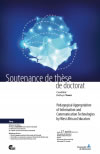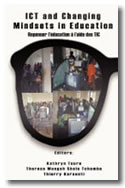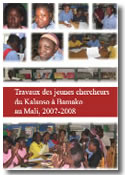Pedagogical Appropriation of Information and Communication Technologies by West African Educators August 27, 2015
 This Ph.D. Thesis was defended by Kathryn Toure on 27 August 2015 at the University of Montreal.
This Ph.D. Thesis was defended by Kathryn Toure on 27 August 2015 at the University of Montreal.
PowerPoint Presentation | PDF Version of PPP
Directeurs de thèse
- Pr. Thierry Karsenti, Université de Montréal
- Pr. Colette Gervais, Université de Montréal
Membres du Jury
- Michel Lepage, président, Université de Montréal
- Diane Biron, examinatrice externe, Université de Sherbrooke
- Vassilis Komis, Université de Patras, Grèce
- François Bowen, représentant de la Doyenne
Abstract
This research investigates how and why educators in West Africa, in Mali in particular, pedagogically appropriate information and communication technologies (ICT) and with what effects. Appropriation involves integrating newness into one’s very being and mobilizing it strategically to meet contextualized objectives, often in resistance to the status quo. It is assumed that ICT use is shaped by the values and objectives of users as well as by the local and global hierarchies of the milieus in which they are used. Qualitative research methods and interpretive approaches revealed meanings educators give to their reality and experiences. Interviews were conducted with 31 persons: 23 primary through high school teachers, six university professors, and two administrators. As educators digested ICT, it became part and parcel of their beings and everyday lives. As they adapted it to their milieus, they worked as cultural agents, mediating between ICT and society. The professors in particular expressed desires to use ICT to facilitate and enhance African participation in global debates and scholarly production and to transform how Africa and Africans are projected and perceived. Educators harnessed ICT for its transformative possibilities. The changes apparent in student-teacher relations (more interactive) and classrooms (more dialogical) suggest that ICT can be a catalyst for pedagogical change, including in document-poor contexts and ones weighed down by legacies of colonialism. Learning from the perspectives and experiences of educators pioneering the use of ICT in education in Africa can inform educational theory, practice and policy and deepen understandings of the concept of appropriation as a process of cultural change.
Résumé
Cette recherche examine comment et pourquoi les éducateurs en Afrique de l’Ouest, au Mali en particulier, s’approprient pédagogiquement les technologies de l’information et de la communication (TIC) et avec quels effets. L’appropriation consiste à intégrer, personnellement et dans son milieu, la nouveauté et à la mobiliser de façon stratégique pour répondre aux objectifs contextualisés, souvent en résistance au statu quo. Une méthodologie qualitative et des approches interprétatives ont permis de comprendre les significations que les éducateurs donnent à leur réalité et leurs expériences. Trente-et-une personnes ont été interviewées: 23 enseignants du primaire et du secondaire, six professeurs d’université, et deux gestionnaires. Les éducateurs ont assimilé les TIC jusqu’à ce qu’elles deviennent partie intégrante de leur être et de leur vie quotidienne. En adaptant les TIC à leur milieu, ils ont travaillé comme des agents culturels, jouant le rôle d’interface entre les TIC et la société. Les professeurs, en particulier, ont exprimé leur souhait d’utiliser les TIC pour faciliter et renforcer la participation africaine aux débats mondiaux et à la production scientifique, et pour changer la perception présente et future de l’Afrique et des Africains. Les éducateurs ont embrassé les TIC pour les possibilités de transformation qu’elles offrent. Des changements apparaissent dans les rapports entre enseignants et étudiants (plus d’interactivités), dans les salles de classes (plus d’échanges) et les contenus des cours (plus actualisés et diversifiés), suggérant que les TIC peuvent avoir un rôle de catalyseur dans l’évolution des pratiques pédagogiques, y compris dans des contextes où l’accès aux documents est difficile et où l’héritage du colonialisme se fait encore sentir. Les perspectives et les expériences des éducateurs utilisant les TIC dans l’éducation en Afrique peuvent enrichir la théorie, la pratique et la politique éducatives et permettre d’avoir une meilleure compréhension du concept d’appropriation comme processus de changement culturel.
Introduction
Teachers are at the heart of pedagogic activity in schools and universities and even in society in general. During changing times, they play a role in interfacing between innovations and learning processes. With the arrival of computers, internet and other information and communication technologies (ICT) in African schools and universities in the 1990s, teachers began grappling with how to integrate them, or not, into pedagogical practices (ROCARE, 2006). In the absence of national policies on ICT in education, individual teachers and certain schools were at the forefront of experimenting with ICT in teaching and learning, adapting it to their needs and aspirations, and shaping how these innovations would be used in a pedagogical context.
Along with other researchers (i.e. Karsenti & Collin, 2013), we identified the need to better understand the experiences of such pioneering educators in order to inform emerging educational policy and practice and current theory on the integration of ICT in education. We thus undertook research in West Africa to understand, from the perspective of educators, how and why they appropriate ICT and, according to them, changes that ensue in the process. The interpretive analysis is developed from what educators shared with us regarding their use of ICT in teaching and learning and remains to be verified by observation and interviews with learners.
When educators use ICT for pedagogical purposes, they exert their agency and invest their beliefs and values in the appropriation process. They shape ICT and are shaped by it. Appropriation is not mastery (Lund, 2009) of a new technology; it is making newness part and parcel of self and society (Bakhtin, 1981; Hountondji, 2002). The concept of appropriation has been used in social science research to understand how people and organizations engage with new technologies (Jouët, 2000; Lohento, 2003; Olsson, 2008; Phillippi & Peña, 2010). In Europe and North America, it has been used to understand how educators integrate ICT into teaching and learning (Laffey, 2004; Lund, 2009). In Africa, it has been used in studying how Africans borrow from various traditions to blend approaches and propose new cultural options (Nyamnjoh, Durham, & Fokwang, 2002; van Binsbergen, 2004). However, the concept had been little employed within the context of African educational systems. This research thus offers a unique lens for comprehending the integration of ICT into teaching and learning processes in schools and universities in Africa. Rather than relating to ICT merely as technology tools, we consider them as cultural innovations being mobilized in specific historical, sociocultural and pedagogical contexts. It is in this way that the significance of ICT in African education and its effects on educational and cultural transformation can be better understood.
This theoretical approach accounts for human ingenuity in confronting complexities and contradictions, and for the non-linearity of constantly adapting the new to achieve contextualized needs and aspirations. It encompasses the themes of colonial legacies, learning from cultural encounters, and drawing from past and present to renew culture and create the future, in contexts in which responsibility for the education of youth is a shared one. It draws on African-inspired understandings of appropriation, learning and development. Our research is presented to contribute to literature on how humans shape and are shaped by cultural innovations such as ICT, in interaction with each other in society. It explores how the process involves conversation (Ela, 2006; Hassoun & Wong, 2012), creative combinations (Dei, 2002a, Fonlon, 2010, 2012), border crossing (Akkerman & Bakker, 2011, Giroux, 1992, 2005), socio-constructive teaching and learning (Bruner, 1996; Obanya, 2012a, 2014), and cultural work (Appadurai, 2013; Ki-Zerbo, 2010a&b, Niane, 1974; Wexler, 1981; Zakhartchouk, 2005).
Chapter 1 of this thesis discusses the need for pedagogies that facilitate active, engaged learning and provide opportunities to rethink and remix cultures and identities in a globalizing world. It describes the proliferation of ICT in African societies and classrooms, and suggests that ICT may embody the potential to promote more open and flexible pedagogies. It reviews literature on the effects of ICT on teaching and learning, and concludes by presenting the general research objective of understanding how and why West African educators appropriate ICT, and with what effects.
Chapter 2 presents the concept of appropriation as a lens through which to understand educators’ use of ICT. Appropriation involves integrating newness into one’s very being and one’s culture and mobilizing it strategically to meet contextualized objectives, often in resistance to the status quo (Bakhtin, 1981; Jouët, 2000; Lund, 2009; Michiels & Crowder, 2001; Nyamnjoh, Durham, & Fokwang, 2002; Surman & Reilly, 2003; Toure, 2009). Because we consider education a socio-constructive process, we also present aspects of socio-constructive educational theory (Bruner, 1996; Obanya, 2012a, 2014; Vygotsky, 1978).
Chapter 3 justifies the use of a qualitative research methodology and interpretive approaches to understand the meaning educators give to their reality and experiences (Bernard, 2006; Karsenti & Savoie-Zajc, 2011; Thomas, 2013; Wertz et al., 2011) and thick description (Geertz, 1973), which is used to analyze and share them. It profiles the 31 interviewees: 23 primary and high school teachers, 6 university professors, and 2 administrators.
Chapter 4 presents the subsequent three chapters, which are the heart of the thesis and in which the research results are presented and discussed. Chapter 5 addresses the first research objective: to understand how and why primary through high school teachers in Mali appropriate ICT in their teaching, and what changes occur during that process. Chapter 6 addresses the second research objective: to explore the ICT appropriation process as teachers interact with others outside the classroom. Chapter 7 addresses the third research objective: to understand why West African university professors pedagogically appropriate ICT.
Finally, in Chapter 8, we review the research results presented in each of the three previous chapters and in relation to the three research objectives. We then conclude with an explanation of changes that are evident at multiple levels (Nasir & Hand, 2006; Rogoff, 1995) – from the classroom, to the community and to the wider world – with the pedagogical appropriation of ICT in the West African contexts in which the research took place. We mention the strengths and limitations of our research process, present recommendations for educational policy reform and practice, and propose ideas for future research.
Through this study, we hope to communicate the innovativeness of the educators we interviewed, their role in the revitalization of education and culture in West Africa, and the intricacy of the unending process of appropriating ICT in teaching and learning.


